新概念英语(成人版)第二册Lesson1 A private conversation课件
文档属性
| 名称 | 新概念英语(成人版)第二册Lesson1 A private conversation课件 | 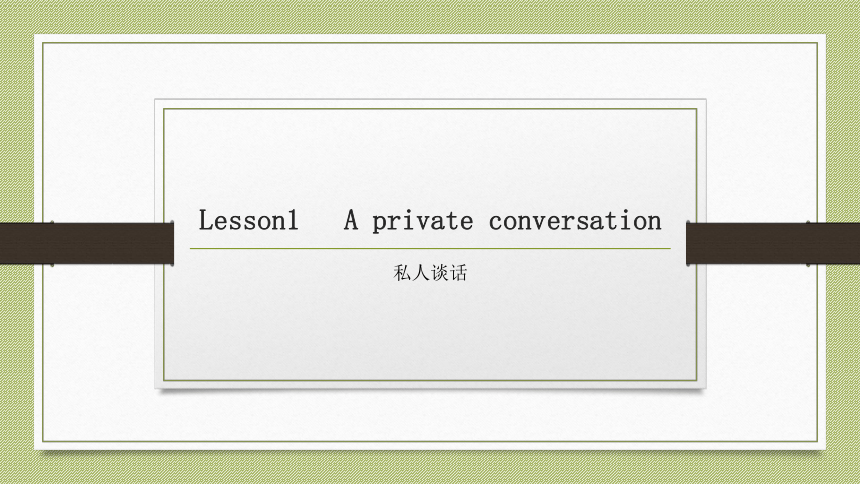 | |
| 格式 | pptx | ||
| 文件大小 | 14.2MB | ||
| 资源类型 | 试卷 | ||
| 版本资源 | 新概念英语 | ||
| 科目 | 英语 | ||
| 更新时间 | 2022-06-29 10:59:53 | ||
图片预览


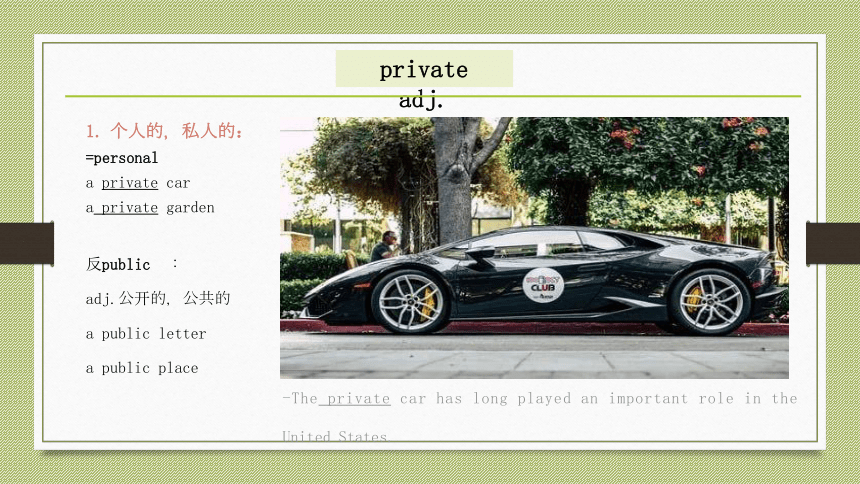
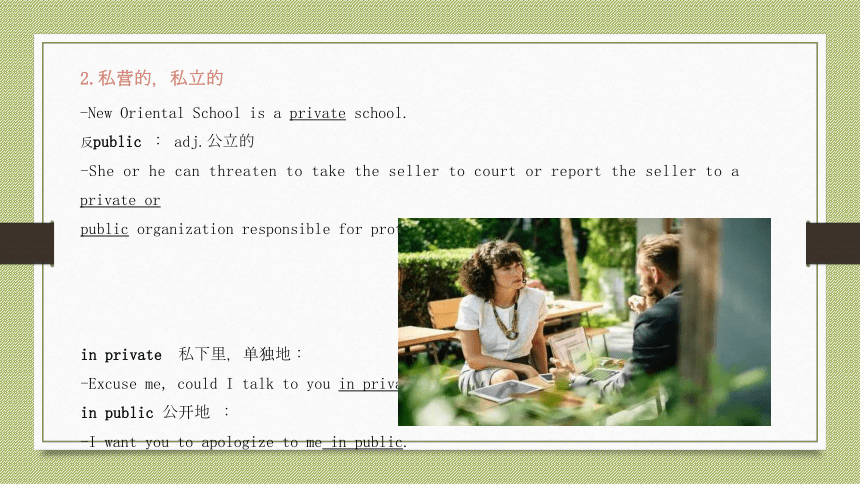
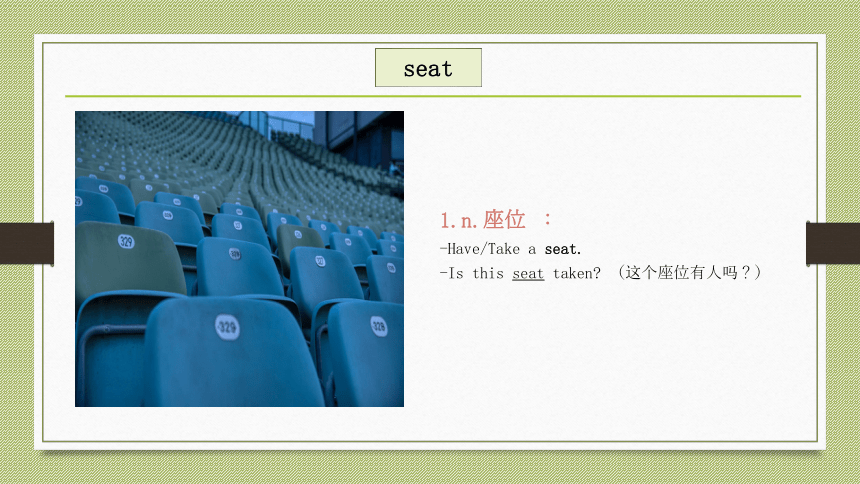
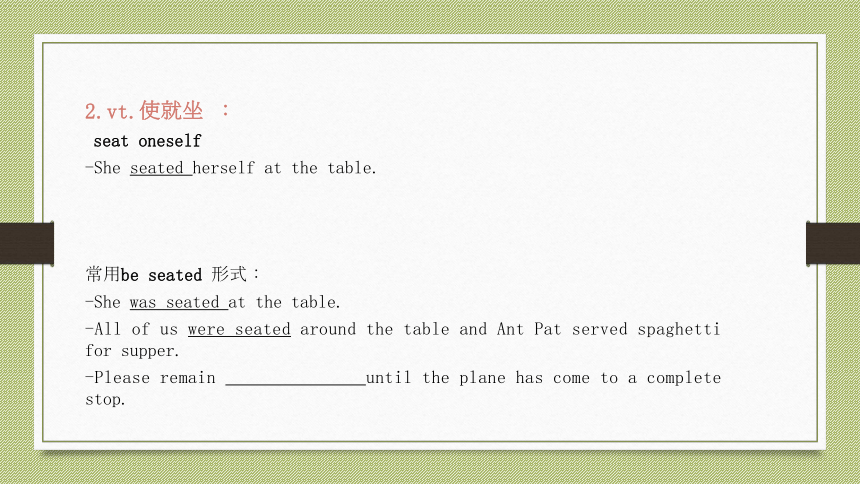
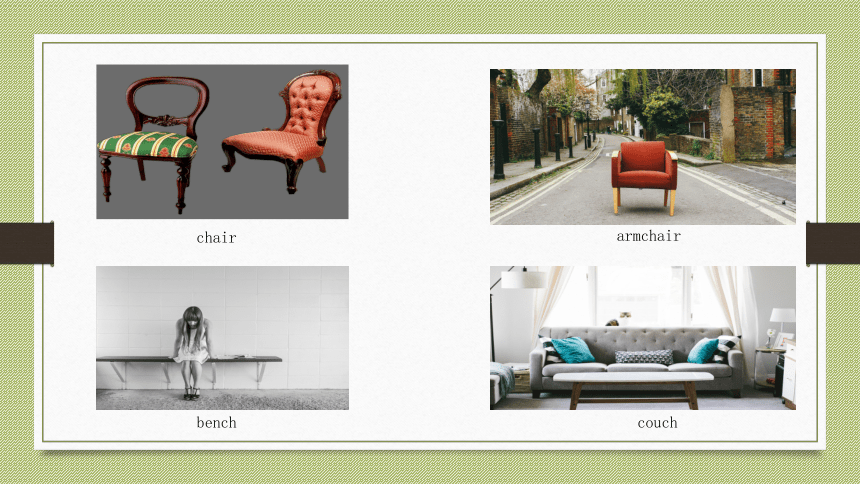
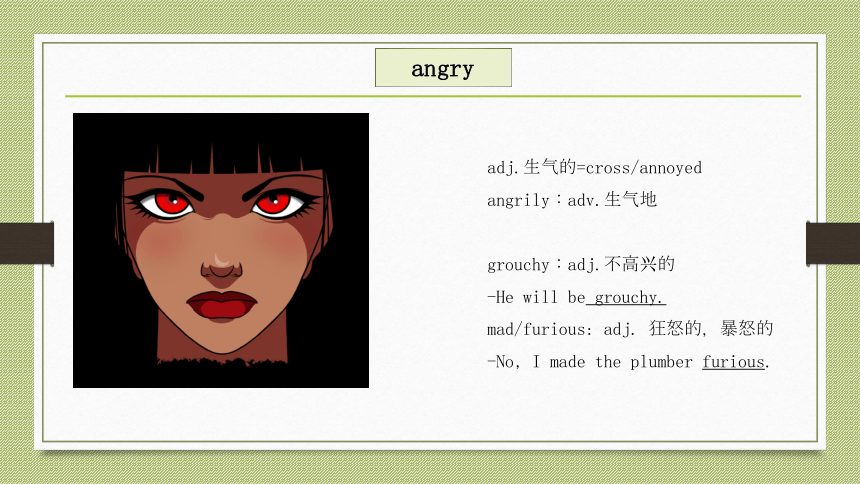
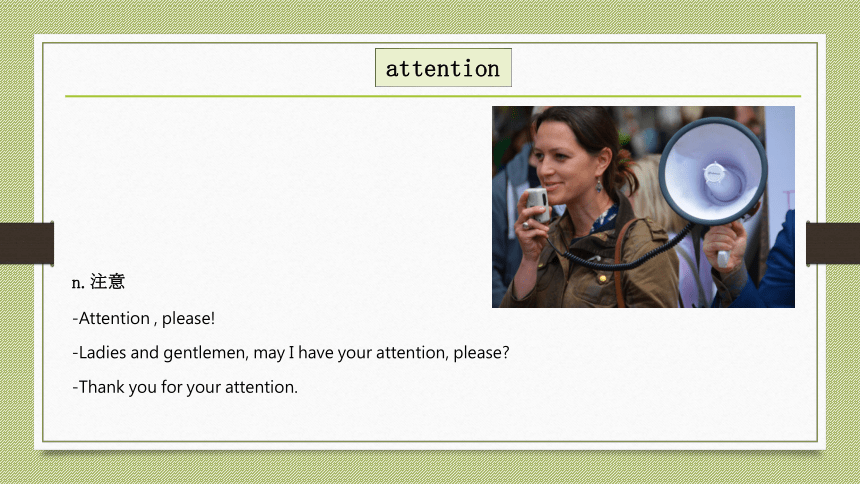
文档简介
(共22张PPT)
Lesson1 A private conversation
私人谈话
情景认识
Last week I went to the theatre. I had a very good seat. The play was very interesting. I did not enjoy it. A young man and a young woman were sitting behind me. They were talking loudly. I got very angry. I could not hear the actors. I turned round. I looked at the man and the woman angrily. They did not pay any attention. In the end, I could not bear it. I turned round again. ‘I can't hear a word!’ I said angrily.
‘It's none of your business, ’ the young man said rudely. ‘This is a private conversation!’
private adj.
个人的,私人的:
=personal
a private car
a private garden
反public :
adj.公开的,公共的
a public letter
a public place
-The private car has long played an important role in the United States.
2.私营的,私立的
-New Oriental School is a private school.
反public : adj.公立的
-She or he can threaten to take the seller to court or report the seller to a private or
public organization responsible for protecting consumers‘rights.
in private 私下里,单独地:
-Excuse me, could I talk to you in private
in public 公开地 :
-I want you to apologize to me in public.
seat
1.n.座位 :
-Have/Take a seat.
-Is this seat taken (这个座位有人吗?)
2.vt.使就坐 :
seat oneself
-She seated herself at the table.
常用be seated 形式:
-She was seated at the table.
-All of us were seated around the table and Ant Pat served spaghetti for supper.
-Please remain until the plane has come to a complete stop.
chair
armchair
bench
couch
angry
adj.生气的=cross/annoyed
angrily:adv.生气地
grouchy:adj.不高兴的
-He will be grouchy.
mad/furious: adj. 狂怒的,暴怒的
-No, I made the plumber furious.
attention
n.注意
-Attention , please!
-Ladies and gentlemen, may I have your attention, please
-Thank you for your attention.
pay attention to … :
-Pay attention to spelling.
pay great attention to … :非常注意
pay no attention to ... : 一点也不注意
-If your family didn’t pay attention to your needs when you were child , you probably have trouble letting others know your needs now.
bear
1.容忍,忍受
-I can’t bear that smell.
同义词:
stand & put up with
-They are only interested in outward appearance and they take advantage of the fact that women will put up with any amount of discomfort, as long as they look right.
-She has borne two children.
-I was born into a poor family.
ps : bear表“生育”用于被动语态时分词用born而不用borne
2.生育
bear market /bull market
3.熊 :
business
n.事,事情(尤指某人自己的事情)
-Phoebe: You know, this is probably none of my business, but weren’t you guys supposed to not be seen in public together
英语中简单陈述句的语序:
When Who Which What Action Who Which What How Where (When)
I have had breakfast.
Yesterday I saw a movie at home.
He opened the door quietly.
Last week I went to the theatre.
I had a very good seat.
The play was very interesting.
英语中五种基本句型:
主语+vi. -The telephone rang.
主语+vt. -I love animals.
主语+vt.+双宾语 -He lent me a book./He lent a book to me.
主语+vt.+宾语+宾补 -He is finding this trip very exciting.
主语+系动词+表语 -The play was very interesting.
表语:补充说明主语,常由n./adj./adv./介宾短语/句子组成。
他在上海。-He is in Shanghai.(介宾短语)
他在国外。-He is abroad.(adv.)
他是我兄弟。-He is my brother.(n.)
他很兴奋。 -He is very excited.(adj.)
习题
1. The writer turned round. He looked at the man and the woman angrily_________.
a. and they stop talking
b. but they didn't stop talking
c. but they didn't notice him
d. but they looked at him rudely
2. The young man said, 'It's none of your business.’
a. He was talking to the young woman.
b. He was talking about the play.
c. He thought the writer was trying to listen to his conversation with the young woman.
d. He thought the writer was asking him a question.
b
c
3. Last week the writer went to the theatre. He was ________the theatre.
a. to
b. at
c. into
d. on
4. The young man and young woman were sitting behind him. He was sitting ______.
a.before
b. above
c. ahead of
d. in front of
b
d
5. ______ did the writer feel Angry.
Where
Why
c. How
d. When
6. He looked at the man and the woman angrily. He looked at _______ angrily.
them
b. they
c. their
d. us
c
a
7. The young man and the young woman paid ______ attention.
none
b. any
c. not any
d. No
8. He had a good seat. He was sitting in a good _______.
chair
b. place
c. armchair
d. class
d
b
9. He was a young man. He wasn't very ______.
old
b. big
c. tall
d. large
10. The writer looked at the man and the woman angrily. He was very ______.
sad
b. unhappy
c. cross
d. pleased
a
c
11. The writer could not bear it. He could not ______ it.
carry
b. suffer
c. stand
d. lift
12. The young man spoke rudely. He wasn’t very ______.
clever
b. rude
c. polite
d. kind
c
c
Lesson1 A private conversation
私人谈话
情景认识
Last week I went to the theatre. I had a very good seat. The play was very interesting. I did not enjoy it. A young man and a young woman were sitting behind me. They were talking loudly. I got very angry. I could not hear the actors. I turned round. I looked at the man and the woman angrily. They did not pay any attention. In the end, I could not bear it. I turned round again. ‘I can't hear a word!’ I said angrily.
‘It's none of your business, ’ the young man said rudely. ‘This is a private conversation!’
private adj.
个人的,私人的:
=personal
a private car
a private garden
反public :
adj.公开的,公共的
a public letter
a public place
-The private car has long played an important role in the United States.
2.私营的,私立的
-New Oriental School is a private school.
反public : adj.公立的
-She or he can threaten to take the seller to court or report the seller to a private or
public organization responsible for protecting consumers‘rights.
in private 私下里,单独地:
-Excuse me, could I talk to you in private
in public 公开地 :
-I want you to apologize to me in public.
seat
1.n.座位 :
-Have/Take a seat.
-Is this seat taken (这个座位有人吗?)
2.vt.使就坐 :
seat oneself
-She seated herself at the table.
常用be seated 形式:
-She was seated at the table.
-All of us were seated around the table and Ant Pat served spaghetti for supper.
-Please remain until the plane has come to a complete stop.
chair
armchair
bench
couch
angry
adj.生气的=cross/annoyed
angrily:adv.生气地
grouchy:adj.不高兴的
-He will be grouchy.
mad/furious: adj. 狂怒的,暴怒的
-No, I made the plumber furious.
attention
n.注意
-Attention , please!
-Ladies and gentlemen, may I have your attention, please
-Thank you for your attention.
pay attention to … :
-Pay attention to spelling.
pay great attention to … :非常注意
pay no attention to ... : 一点也不注意
-If your family didn’t pay attention to your needs when you were child , you probably have trouble letting others know your needs now.
bear
1.容忍,忍受
-I can’t bear that smell.
同义词:
stand & put up with
-They are only interested in outward appearance and they take advantage of the fact that women will put up with any amount of discomfort, as long as they look right.
-She has borne two children.
-I was born into a poor family.
ps : bear表“生育”用于被动语态时分词用born而不用borne
2.生育
bear market /bull market
3.熊 :
business
n.事,事情(尤指某人自己的事情)
-Phoebe: You know, this is probably none of my business, but weren’t you guys supposed to not be seen in public together
英语中简单陈述句的语序:
When Who Which What Action Who Which What How Where (When)
I have had breakfast.
Yesterday I saw a movie at home.
He opened the door quietly.
Last week I went to the theatre.
I had a very good seat.
The play was very interesting.
英语中五种基本句型:
主语+vi. -The telephone rang.
主语+vt. -I love animals.
主语+vt.+双宾语 -He lent me a book./He lent a book to me.
主语+vt.+宾语+宾补 -He is finding this trip very exciting.
主语+系动词+表语 -The play was very interesting.
表语:补充说明主语,常由n./adj./adv./介宾短语/句子组成。
他在上海。-He is in Shanghai.(介宾短语)
他在国外。-He is abroad.(adv.)
他是我兄弟。-He is my brother.(n.)
他很兴奋。 -He is very excited.(adj.)
习题
1. The writer turned round. He looked at the man and the woman angrily_________.
a. and they stop talking
b. but they didn't stop talking
c. but they didn't notice him
d. but they looked at him rudely
2. The young man said, 'It's none of your business.’
a. He was talking to the young woman.
b. He was talking about the play.
c. He thought the writer was trying to listen to his conversation with the young woman.
d. He thought the writer was asking him a question.
b
c
3. Last week the writer went to the theatre. He was ________the theatre.
a. to
b. at
c. into
d. on
4. The young man and young woman were sitting behind him. He was sitting ______.
a.before
b. above
c. ahead of
d. in front of
b
d
5. ______ did the writer feel Angry.
Where
Why
c. How
d. When
6. He looked at the man and the woman angrily. He looked at _______ angrily.
them
b. they
c. their
d. us
c
a
7. The young man and the young woman paid ______ attention.
none
b. any
c. not any
d. No
8. He had a good seat. He was sitting in a good _______.
chair
b. place
c. armchair
d. class
d
b
9. He was a young man. He wasn't very ______.
old
b. big
c. tall
d. large
10. The writer looked at the man and the woman angrily. He was very ______.
sad
b. unhappy
c. cross
d. pleased
a
c
11. The writer could not bear it. He could not ______ it.
carry
b. suffer
c. stand
d. lift
12. The young man spoke rudely. He wasn’t very ______.
clever
b. rude
c. polite
d. kind
c
c
同课章节目录
